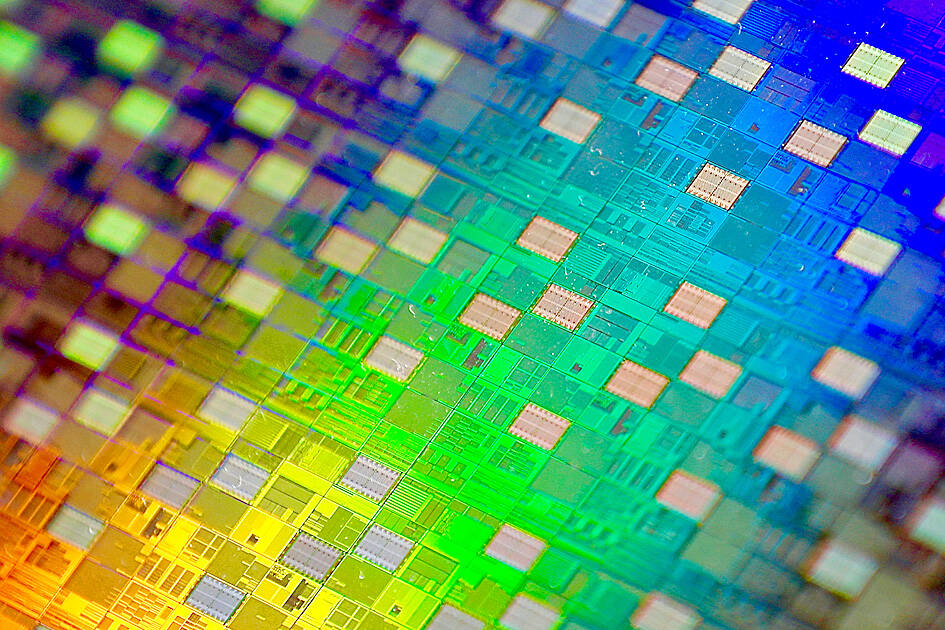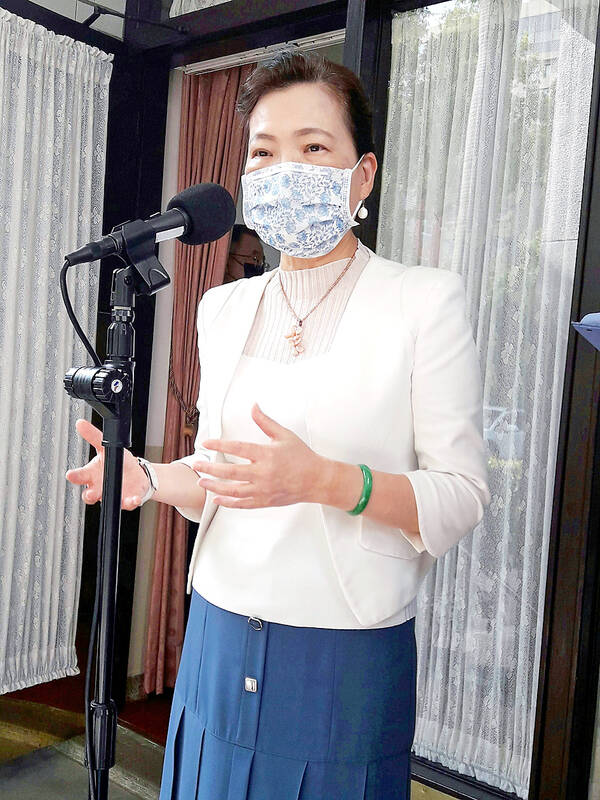The US convened a preliminary meeting of a working group with East Asian countries, including Taiwan, to discuss semiconductor supply chain resilience and cooperation, Minister of Economic Affairs Wang Mei-hua (王美花) said yesterday.
“We exchanged views at a first preliminary meeting and hope everyone can discuss how to collaborate in the future on supply chain problems like the ones we recently encountered,” Wang told reporters in Taipei.
The global chip shortage, which over the past two years has wreaked havoc on supply chains and forced automakers to halt production, thrust chip powerhouse Taiwan into the spotlight and made supply chain management a bigger priority for governments around the world.

Photo: EPA-EFE
The preliminary meeting of the working group — dubbed “Chip 4” — also included representatives from South Korea and Japan, Wang said.
Details about the frequency of future meetings, including their schedule and topics, were not addressed, she said.
The countries are home to critical players in the global semiconductor industry, including Taiwan Semiconductor Manufacturing Co (台積電), the world’s largest contract chipmaker; South Korean memorychip giants Samsung Electronics Co and SK Hynix; and key Japanese suppliers of semiconductor materials and equipment.

Photo: CNA
President Tsai Ing-wen (蔡英文) last month told visiting US lawmakers that Taiwan is committed to ensuring its partners have reliable supplies of semiconductors, which she called “democracy chips,” and urged Taiwan-friendly governments to boost collaboration amid intensified threats from China.
The South Korean Ministry of Foreign Affairs said the country’s top representative in Taiwan attended a preliminary meeting of “the US East Asian Semiconductor Supply Chain Resiliency Working Group” on Wednesday, hosted by the American Institute in Taiwan (AIT).
The AIT did not immediately respond to a request for comment.
Kyung Kye-hyun, who heads Samsung’s chip business, last month said that his company has conveyed concerns about the proposed Chip 4 alliance, including the need for South Korea to seek China’s understanding before any negotiations.
Additional reporting by CNA

CHAOS: Iranians took to the streets playing celebratory music after reports of Khamenei’s death on Saturday, while mourners also gathered in Tehran yesterday Iranian Supreme Leader Ayatollah Ali Khamenei was killed in a major attack on Iran launched by Israel and the US, throwing the future of the Islamic republic into doubt and raising the risk of regional instability. Iranian state television and the state-run IRNA news agency announced the 86-year-old’s death early yesterday. US President Donald Trump said it gave Iranians their “greatest chance” to “take back” their country. The announcements came after a joint US and Israeli aerial bombardment that targeted Iranian military and governmental sites. Trump said the “heavy and pinpoint bombing” would continue through the week or as long

TRUST: The KMT said it respected the US’ timing and considerations, and hoped it would continue to honor its commitments to helping Taiwan bolster its defenses and deterrence US President Donald Trump is delaying a multibillion-dollar arms sale to Taiwan to ensure his visit to Beijing is successful, a New York Times report said. The weapons sales package has stalled in the US Department of State, the report said, citing US officials it did not identify. The White House has told agencies not to push forward ahead of Trump’s meeting with Chinese President Xi Jinping (習近平), it said. The two last month held a phone call to discuss trade and geopolitical flashpoints ahead of the summit. Xi raised the Taiwan issue and urged the US to handle arms sales to

A magnitude 5.6 earthquake struck off the coast of Yilan County at 12:37pm today, with clear shaking felt across much of northern Taiwan. There were no immediate reports of damage. The epicenter of the quake was 16.9km east-southeast of Yilan County Hall offshore at a depth of 66.8km, Central Weather Administration (CWA) data showed. The maximum intensity registered at a 4 in Yilan County’s Nanao Township (南澳) on Taiwan’s seven-tier scale. Other parts of Yilan, as well as certain areas of Hualien County, Taipei, New Taipei City, Taoyuan, Hsinchu County, Taichung and Miaoli County, recorded intensities of 3. Residents of Yilan County and Taipei received

Taiwan has secured another breakthrough in fruit exports, with jujubes, dragon fruit and lychees approved for shipment to the EU, the Ministry of Agriculture said yesterday. The Animal and Plant Health Inspection Agency on Thursday received formal notification of the approval from the EU, the ministry said, adding that the decision was expected to expand Taiwanese fruit producers’ access to high-end European markets. Taiwan exported 126 tonnes of lychees last year, valued at US$1.48 million, with Japan accounting for 102 tonnes. Other export destinations included New Zealand, Hong Kong, the US and Australia, ministry data showed. Jujube exports totaled 103 tonnes, valued at